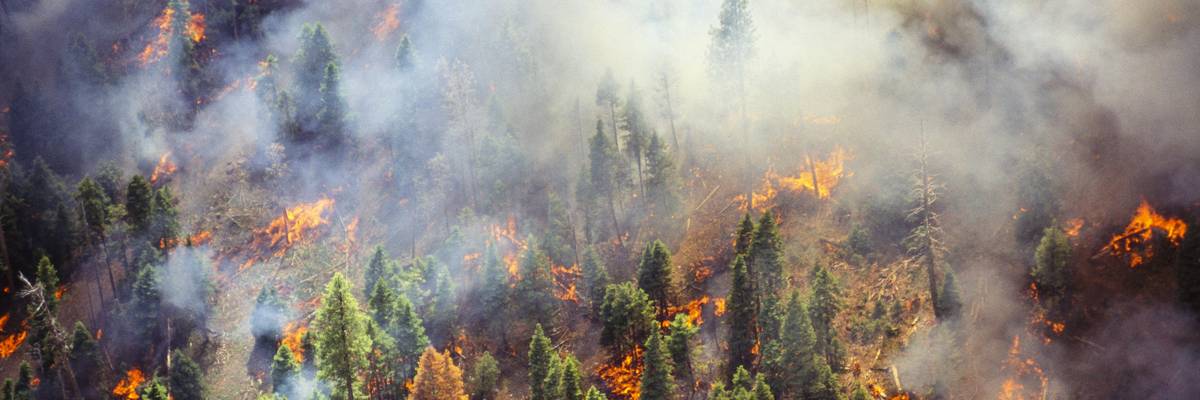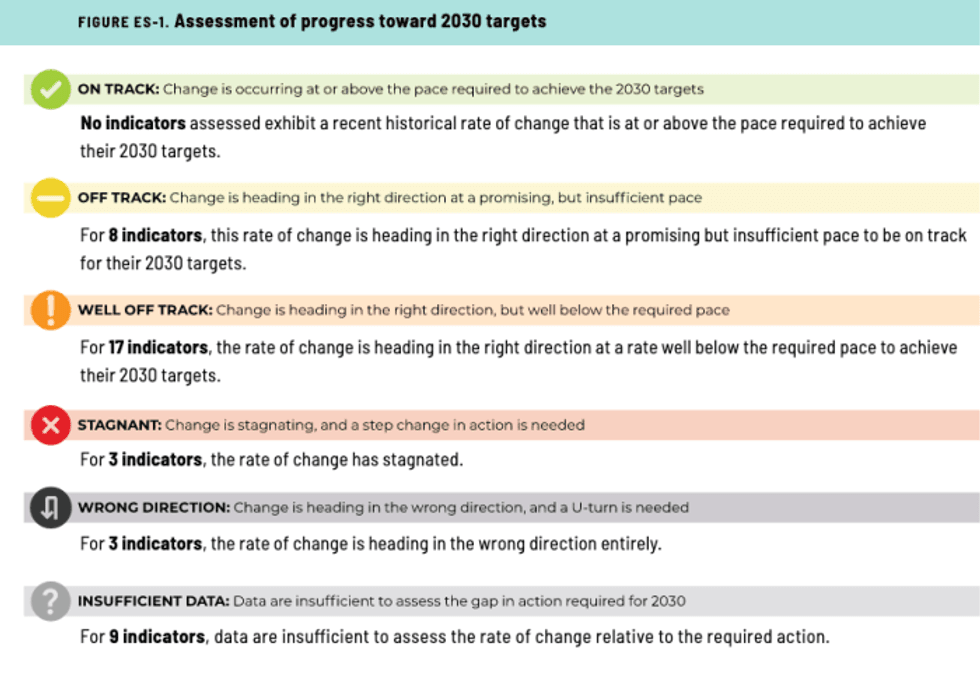

SUBSCRIBE TO OUR FREE NEWSLETTER
Daily news & progressive opinion—funded by the people, not the corporations—delivered straight to your inbox.
5
#000000
#FFFFFF
To donate by check, phone, or other method, see our More Ways to Give page.


Daily news & progressive opinion—funded by the people, not the corporations—delivered straight to your inbox.

The new report out Thusday, said World Resources Institute president and CEO Ani Dasgupta, "is a call to action for policymakers, CEOs and others to take the bold, unprecedented action necessary to point us toward a safer and fairer future." (Photo: Shutterstock)
A new global assessment out Thursday has found that across the vast number of key systems in human society--including energy, manufacturing, transportation, agricultural, and finance--not a single one is transforming fast enough to mitigate the "code red" warnings that scientists and experts have issued on the planetary climate emergency.
"It is clear that the climate crisis is still outpacing our response. This report is a call to action."
The new report--titled "State of Climate Action 2021"--assessed whether the world is "doing enough" to achieve the climate goals of the 2015 Paris agreement by translating "the transformations required to keep global temperature rise to 1.5oC into 40 indicators of progress" based on goals set for achieving meaningful changes by 2030 and 2050, such as phasing out coal, halting deforestation, and ramping up both public and private funding to halt the crisis.
Published under the Systems Change Lab, the report was a joint effort between the High-Level Climate Champions, Climate Action Tracker, ClimateWorks Foundation, the Bezos Earth Fund, and the World Resources Institute. The findings of the report, say its authors, are deeply troubling. According to a joint commentary, the researchers conclude that, "to date, none of the 40 indicators assessed are on track to reach 2030 targets."

With emissions from sectors with among the largest emissions--namely agriculture, automobiles, and deforestation--"moving in the wrong direction" to meet international targets, Kelly Levin, chief of science at the Bezos Earth Fund and one of the report's co-authors, told the Guardian that this reality must be rapidly altered.
"We need complete u-turns from these areas," said Levin. "With climate change you can't just head in the right direction, you need to do it at pace. Without that, we will reach disastrous tipping points."
In the joint commentary, the report's authors conclude that while the situation is dire, all is far from lost--especially if urgency among world leaders--both in the public and private sectors--is immediately ramped up:
Our ever-shrinking carbon budget does not accommodate delay. Should we fail to act now and greenhouse gas emissions continue to rise unabated, warming could climb to between 3.3 degrees C and 5.7 degrees C (5.9 degrees F and 10 degrees F) above preindustrial levels by 2100 -- temperatures that would intensify the catastrophic impacts far beyond anything seen so far.
But if we can make a true step-change in ambition and action, as we're beginning to see in some corners of the world, at COP26 and beyond, we can bring the enormous task of holding global temperature rise to 1.5 degrees C within reach and secure a safer, more prosperous and equitable future for all.
The "encouraging news," according to the report, "is that we're not starting from a standstill--the majority of indicators (25) are moving in the right direction, albeit too slowly. Of the remaining 15 indicators, recent progress has stagnated for three, change is heading in the wrong direction entirely for another three, and the remaining nine lack sufficient data to assess progress."
Ani Dasgupta, president and CEO of the World Resources Institute, said, "While there are encouraging signs of progress across many sectors, it is clear that the climate crisis is still outpacing our response. This report is a call to action for policymakers, CEOs and others to take the bold, unprecedented action necessary to point us toward a safer and fairer future."
Dear Common Dreams reader, The U.S. is on a fast track to authoritarianism like nothing I've ever seen. Meanwhile, corporate news outlets are utterly capitulating to Trump, twisting their coverage to avoid drawing his ire while lining up to stuff cash in his pockets. That's why I believe that Common Dreams is doing the best and most consequential reporting that we've ever done. Our small but mighty team is a progressive reporting powerhouse, covering the news every day that the corporate media never will. Our mission has always been simple: To inform. To inspire. And to ignite change for the common good. Now here's the key piece that I want all our readers to understand: None of this would be possible without your financial support. That's not just some fundraising cliche. It's the absolute and literal truth. We don't accept corporate advertising and never will. We don't have a paywall because we don't think people should be blocked from critical news based on their ability to pay. Everything we do is funded by the donations of readers like you. Will you donate now to help power the nonprofit, independent reporting of Common Dreams? Thank you for being a vital member of our community. Together, we can keep independent journalism alive when it’s needed most. - Craig Brown, Co-founder |
A new global assessment out Thursday has found that across the vast number of key systems in human society--including energy, manufacturing, transportation, agricultural, and finance--not a single one is transforming fast enough to mitigate the "code red" warnings that scientists and experts have issued on the planetary climate emergency.
"It is clear that the climate crisis is still outpacing our response. This report is a call to action."
The new report--titled "State of Climate Action 2021"--assessed whether the world is "doing enough" to achieve the climate goals of the 2015 Paris agreement by translating "the transformations required to keep global temperature rise to 1.5oC into 40 indicators of progress" based on goals set for achieving meaningful changes by 2030 and 2050, such as phasing out coal, halting deforestation, and ramping up both public and private funding to halt the crisis.
Published under the Systems Change Lab, the report was a joint effort between the High-Level Climate Champions, Climate Action Tracker, ClimateWorks Foundation, the Bezos Earth Fund, and the World Resources Institute. The findings of the report, say its authors, are deeply troubling. According to a joint commentary, the researchers conclude that, "to date, none of the 40 indicators assessed are on track to reach 2030 targets."

With emissions from sectors with among the largest emissions--namely agriculture, automobiles, and deforestation--"moving in the wrong direction" to meet international targets, Kelly Levin, chief of science at the Bezos Earth Fund and one of the report's co-authors, told the Guardian that this reality must be rapidly altered.
"We need complete u-turns from these areas," said Levin. "With climate change you can't just head in the right direction, you need to do it at pace. Without that, we will reach disastrous tipping points."
In the joint commentary, the report's authors conclude that while the situation is dire, all is far from lost--especially if urgency among world leaders--both in the public and private sectors--is immediately ramped up:
Our ever-shrinking carbon budget does not accommodate delay. Should we fail to act now and greenhouse gas emissions continue to rise unabated, warming could climb to between 3.3 degrees C and 5.7 degrees C (5.9 degrees F and 10 degrees F) above preindustrial levels by 2100 -- temperatures that would intensify the catastrophic impacts far beyond anything seen so far.
But if we can make a true step-change in ambition and action, as we're beginning to see in some corners of the world, at COP26 and beyond, we can bring the enormous task of holding global temperature rise to 1.5 degrees C within reach and secure a safer, more prosperous and equitable future for all.
The "encouraging news," according to the report, "is that we're not starting from a standstill--the majority of indicators (25) are moving in the right direction, albeit too slowly. Of the remaining 15 indicators, recent progress has stagnated for three, change is heading in the wrong direction entirely for another three, and the remaining nine lack sufficient data to assess progress."
Ani Dasgupta, president and CEO of the World Resources Institute, said, "While there are encouraging signs of progress across many sectors, it is clear that the climate crisis is still outpacing our response. This report is a call to action for policymakers, CEOs and others to take the bold, unprecedented action necessary to point us toward a safer and fairer future."
A new global assessment out Thursday has found that across the vast number of key systems in human society--including energy, manufacturing, transportation, agricultural, and finance--not a single one is transforming fast enough to mitigate the "code red" warnings that scientists and experts have issued on the planetary climate emergency.
"It is clear that the climate crisis is still outpacing our response. This report is a call to action."
The new report--titled "State of Climate Action 2021"--assessed whether the world is "doing enough" to achieve the climate goals of the 2015 Paris agreement by translating "the transformations required to keep global temperature rise to 1.5oC into 40 indicators of progress" based on goals set for achieving meaningful changes by 2030 and 2050, such as phasing out coal, halting deforestation, and ramping up both public and private funding to halt the crisis.
Published under the Systems Change Lab, the report was a joint effort between the High-Level Climate Champions, Climate Action Tracker, ClimateWorks Foundation, the Bezos Earth Fund, and the World Resources Institute. The findings of the report, say its authors, are deeply troubling. According to a joint commentary, the researchers conclude that, "to date, none of the 40 indicators assessed are on track to reach 2030 targets."

With emissions from sectors with among the largest emissions--namely agriculture, automobiles, and deforestation--"moving in the wrong direction" to meet international targets, Kelly Levin, chief of science at the Bezos Earth Fund and one of the report's co-authors, told the Guardian that this reality must be rapidly altered.
"We need complete u-turns from these areas," said Levin. "With climate change you can't just head in the right direction, you need to do it at pace. Without that, we will reach disastrous tipping points."
In the joint commentary, the report's authors conclude that while the situation is dire, all is far from lost--especially if urgency among world leaders--both in the public and private sectors--is immediately ramped up:
Our ever-shrinking carbon budget does not accommodate delay. Should we fail to act now and greenhouse gas emissions continue to rise unabated, warming could climb to between 3.3 degrees C and 5.7 degrees C (5.9 degrees F and 10 degrees F) above preindustrial levels by 2100 -- temperatures that would intensify the catastrophic impacts far beyond anything seen so far.
But if we can make a true step-change in ambition and action, as we're beginning to see in some corners of the world, at COP26 and beyond, we can bring the enormous task of holding global temperature rise to 1.5 degrees C within reach and secure a safer, more prosperous and equitable future for all.
The "encouraging news," according to the report, "is that we're not starting from a standstill--the majority of indicators (25) are moving in the right direction, albeit too slowly. Of the remaining 15 indicators, recent progress has stagnated for three, change is heading in the wrong direction entirely for another three, and the remaining nine lack sufficient data to assess progress."
Ani Dasgupta, president and CEO of the World Resources Institute, said, "While there are encouraging signs of progress across many sectors, it is clear that the climate crisis is still outpacing our response. This report is a call to action for policymakers, CEOs and others to take the bold, unprecedented action necessary to point us toward a safer and fairer future."